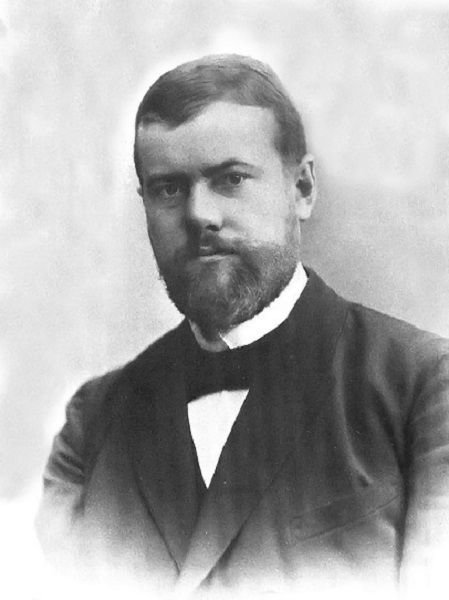Max Weber is one of the founders of the modern German and European sociology and politics of the twentieth century. The second category of prerequisites are of primary importance as they explain (according to M. Weber) how politology is possible as an objective science and a basis for effectiveness and political practice. Naturally, we will focus our attention in this analysis on concepts in the field of political theory, starting with the very broad concept of politics. For Weber, politics can not be defined beyond the attitude of power. He believes power is the ability to impose our will on the behavior of others. It is necessary to awaken and develop faith in its own legitimacy, ie the belief that the ruling people have the right to rule that their domination is legitimate. The Concept of Legitimacy of Dominance M. Weber summarized in his lecture "Politics as a calling" as follows - there are, in principle, three types of internal justification (Rechtfertigungen), ie the legitimacy of dominance. This is first, the authority of" eternally yesterday, "of custom, apart from its antiquity and the habitual attitude of its observance: dominance, as the Patriarchate and the patriarchal ruler of an old type have practiced it. Secondly, the authority of extraordinary personal charisma: it is based on total personal devotion and personal trust in the revelations, heroism or other qualities of a person: "charisma or "in the field of politics" by the chosen military leader or plebiscite ruler, by the great demagogue or by the political party leader. Finally, there is domination by virtue of "legality" / law / . of the belief in the validity of the prescribed legal norms ("satle") and the "competence" based on rationally created rules, therefore, by virtue of the attitude of obedience in fulfillment of written, regulated obligations - that is the dominance exercised by the modern A "civil servant" and all those who have power in this respect. Of course, in real life obedience is conditioned by overly strong motives of fear and hope - fear of revenge of magical powers or the lord, and reward in this or that world and from many different interests ... But when it comes to that, what kind of "ligitimnost" is based on obedience, then in any case we come across these three "pure" types. In fact, these pure types of legitimacy and domination are rarely encountered. There are many tangled varieties, transitions and combinations of pure types in history.
What is the state?
The modern state is "that human community which, in a particular territory (and this" territory "is a distinctive mark), claims to have a monopoly on legitimate physical violence." For him, violence (or the threat of violence) means, firstly, legal regulation / backed by coercion, and second, punishment / or threat of punishment / to those who violate laws.
In this sense, the state is the only source of the legitimate use of physical violence, coercion. According to other authors, Weber's definition can be seen as an attempt to synthesize opposing theories of coercion and consensus, which characterize the whole history of political thought, since it requires the coercion of consensus, ie the laws of the state.
By using this attitude to obedience, domination must have those essential components that are necessary for the eventual application of legitimate physical violence, namely personal management headquarters and substantive management means. M. Weber speaks of two categories of professional politicians: some who "live for politics" and others who live in politics " M. Weber is one of the first to set a high level of professionalism and the issue of the difference between political leaders and political clerks-journalists, party officials / and between political and non-political civil servants / specialists in government /
Since the creation of the constitutional state and especially after the establishment of democracy, the demagogue is typical of the Western world-led politician. / What irony about contemporary political journalists! / Weber points out some important characteristics of the sociology of political journalism and the journalist. Here is the characteristic contained in "Politics as a vocation": Not everyone realizes that a truly good journalistic achievement claims at least as much a "spirit" as any achievement in science - mostly because the need requires that the journalistic product be placed immediately, on command, and act in very different conditions of creativity compared to those of a scientist. The fact that responsibility is much greater and the sense of responsibility of any reputable journalist as a whole is by no means lower than that of the scientist, and even higher / as shown in is almost never appreciated by people of dignity, as they remembered just irresponsible journalistic achievements for their often terrible consequences ... M. Weber puts his decision on the development of the party-political system. According to M. Weber, parliament is increasingly becoming a facade, and actual power is exercised by parties and their leaders.

You have recieved a free upvote from minnowpond, Send 0.1 -> 2 SBD with your post url as the memo to recieve an upvote from up to 100 accounts!
Downvoting a post can decrease pending rewards and make it less visible. Common reasons:
Submit
Thank you :)
Downvoting a post can decrease pending rewards and make it less visible. Common reasons:
Submit
Nicely written, so where to from here. Does Weber predict what can be done to right what has become so wrong with today's politics?
Downvoting a post can decrease pending rewards and make it less visible. Common reasons:
Submit